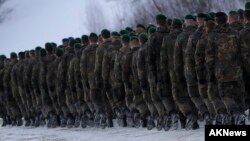European leaders were left shaken following U.S. President Donald Trump’s recent comments that NATO is "obsolete."
The organization has formed the bedrock of Europe’s security since World War Two, but some EU leaders say Europe must now take responsibility for its own defense. The continent would face a huge deficit in military capability if the NATO alliance broke down.
The first contingent of German and Belgian troops arrived in Lithuania on Tuesday, which followed a separate U.S. deployment of the 3rd Armored Brigade Combat Team, 4th Infantry Division, to Poland in early January. The buildup is part of NATO’s 4,000 troop reinforcement in the Baltic States and Poland, which aims to reassure front-line states.
But Trump’s recent comments that NATO is "obsolete" have shaken European allies.
Wolfgang Ischinger, head of the Munich Security Conference, an annual global summit on defense due to take place next month, tells VOA the situation is tense.
“In addition to the crises we had last year, Ukraine, Syria, the South China Sea, North Korea, etc., now we appear to have almost panic in the trans-Atlantic space," Ischinger said. "Is NATO obsolete or not? Is the European Union something which the U.S. can or should ignore, or is the EU America's most important partner?”
German Chancellor Angela Merkel has said Europe now has its fate in its own hands. But Jonathan Eyal of Britain's Royal United Services Institute says it will take a dramatic shift in EU policy to make up for any rupture in the U.S. alliance.
“While there is a lot of discussion about closer cooperation in the European Union, there simply is no substitute for American military power," said Eyal. "Up to 75 percent of all the military assets in NATO belong to the United States.”
Military spending
Currently Germany, along with several other European NATO allies, spend far less on defense than the 2 percent of GDP (Gross Domestic Product) they pledged to spend in 2014.
“There is a commitment in Germany to increase defense expenditure, but we are far off, and, especially in an election year in Germany, we will remain far [from] any chance of a major boost in defense expenditure," said Eyal.
Core members including France, Germany, Spain and Italy want closer EU military and intelligence cooperation, a move backed by the bloc’s foreign policy chief Federica Mogherini.
"First of all it means that Europeans are starting to take seriously their security," said Mogherini. "We have started to do this ... well before the UK referendum, well before the U.S. elections because security is a priority for Europeans.”
Britain has blocked efforts towards building an EU military alliance, fearing it could undermine NATO.
But with Britain set to leave the bloc within the next few years, the calls for an EU military force could grow louder.
On the eastern flank
Britain's former Ambassador to Georgia, Alexandra Hall Hall of the Washington-headquartered Atlantic Council, says countries on Europe's easternmost flank have a particular responsibility to gird themselves for a world with or without a U.S.-backed NATO.
"It is incumbent for countries in this region supported by their friends and allies to make clear that any new U.S.-Russia cooperation should not come at the expense of the interests of friends and allies," Hall Hall told VOA's Georgian Service, explaining that she hopes countries such as Ukraine and Georgia, each of which were invaded by Russian forces within the last ten years, should move fast to show that their values align with long-term U.S. interests.
"Putin will push as far as he will get, in Georgia, in Ukraine," she said. "If you don’t stand firm to set boundaries on unacceptable behavior, you will see other problems cropping up.
"Georgia remains a successful example of what can be achieved with the support of EU and NATO and remains a model for other countries," she added. "What I would really like to see to happen in Georgia is that a very strong, united message come to the new U.S. administration. A very early engagement on the values you share and how you can work with new administration."
London-based Russia expert James Sherr seemed to echo that sentiment, warning that crafting policy solely in response to actions by the Trump administration carries its own risks.
"The real danger is that it will take a long time for a new policymaking system to emerge in the United States," Sherr told VOA's Ukrainian Service. "There's so many variables, there are so many different players, and there are so many informal actors that there's potential for chaos.
"This is a greater worry than the risk that the United States will make some grand damaging bargain with Russia that will change the whole European order. This situation could be chaotic and confused for a long time. This doesn't necessarily benefit Russia, but it certainly doesn't benefit Europe," he said.
"It's not going to benefit Ukraine either, but it also might mean that, at the level that thing happen -- say, for example, training Ukraine's armed forces, which is something that's been going on for a long time, or economic assistance, or even sanctions -- that a lot of things will simply continue, because there's been no real decision to stop it," Sherr said.
"Trump himself is not going to make it easy, because he has certain considerable authority of his own—and he can do some very rash and inconsistent things," he added. "So I'm not saying it's going to be good. That's not the point. But at this stage we just don't know.
"Everyone understands now that Russia is a serious and potentially dangerous military power; Europe, however, is not a hard-power animal," Sherr said.
"Trump's rash, ill-mannered threats about NATO have immediately produced a change of attitude in Europe and a consensus that defense spending in Europe must rise. He's been able to do this, through his bad behavior, more quickly and more effectively than two previous administrations that were more reliable from a European standpoint. So the United States continues to matter profoundly to Europe, and this will be particularly the case if the dynamics of disintegration continue inside the EU," he said.
Nana Sajaia of VOA’s Georgian Service and Bogdan Tsioupine of VOA's Urkainian Service contributed original reporting.






